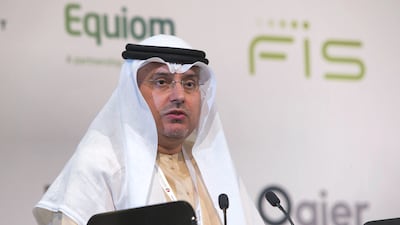The UAE is to cut some worker permit fees for private sector companies that voluntarily exceed Emiratisation targets, it was announced on Tuesday.
This means that companies that go above and beyond what is legally required will pay only Dh250 for certain permits rather than Dh3,750.
The move comes as part of a new private sector company classification system that is being introduced by the Ministry of Human Resources and Emiratisation.
The system — in effect from June 1 — aims to protect workers' rights, empower business owners and promote a spirit of innovation in the private sector.
Abdul Al Awar, Minister of Human Resources and Emiratisation, announced the programme on Tuesday, saying it assesses firms on how they are following UAE law such as enacting labour and wage payment rules, safeguarding workers' rights and promoting diversity.
Companies that fulfil all criteria will fall into the second category while those that flout UAE law will fall into the third. Those that exceed targets will be placed into the first category and receive a significant reduction in the price of some permits.
Some companies can progress to the first tier if they meet one of the following voluntary requirements: raise Emiratisation rate three times above the 2 per cent target; comply with the government “Nafis” project to train 500 Emiratis annually; be a venture owned by a young Emirati; or promote diversity in the workplace.
“Private companies [above 50 employees] hiring a maximum of 20 per cent employees from a specific nationality will meet the standard of cultural diversity,” said Mr Al Awar.
“This will not only help companies get discounts on ministry service fees but provide them with more flexibility to attract talent.”
Fee reductions apply to a number of services that include issuing a two-year work permit, a one-mission work permit, renewing work permits and renewing contracts, all of which can cost up to Dh3,750, but companies that fulfil any or all of the new requirements will pay only Dh250.
Firms in the second category will pay Dh1,200 per permit and those in the third category will pay Dh3,450.
The ministry said it will work with companies on the new system and provide a road map for those wishing to upgrade their classification. More details about how it works are also expected.
UAE Salary Guide
“This is part of a comprehensive system that aims to boost the labour market, strengthen the partnership with the private sector while also helping the country’s economy become one of the best in the world,” said Mr Al Awar.
“It will empower workers, protect their rights and provide them with guarantees and assist companies to achieve a sustainable development.”
It comes following several measures introduced this month that aim to encourage the hiring of more Emiratis in the private sector.
The UAE Cabinet decreed that companies with more than 50 employees should have a 2 per cent Emirati workforce by next year, moving to up to 10 per cent by 2026.
A company that fails to reach the target must pay Dh6,000 a month for every Emirati it fails to hire.
The project is being carried out through Nafis, a federal programme that aims to integrate more Emiratis into the private sector.
“The government wants to make it clear they are serious about Emiratisation,” said Raka Roy, partner at Galadari Advocates & Legal Consultants.
Ghannam Al Mazrouei, secretary general of the Emirati Talent Competitiveness Council, said that hiring Emiratis should not encumber a business.
“The government has also subsidised a training programme for one year, so the private sector will not be burdened with these costs,” he said on Dubai Eye's Business Breakfast radio show.

























































































